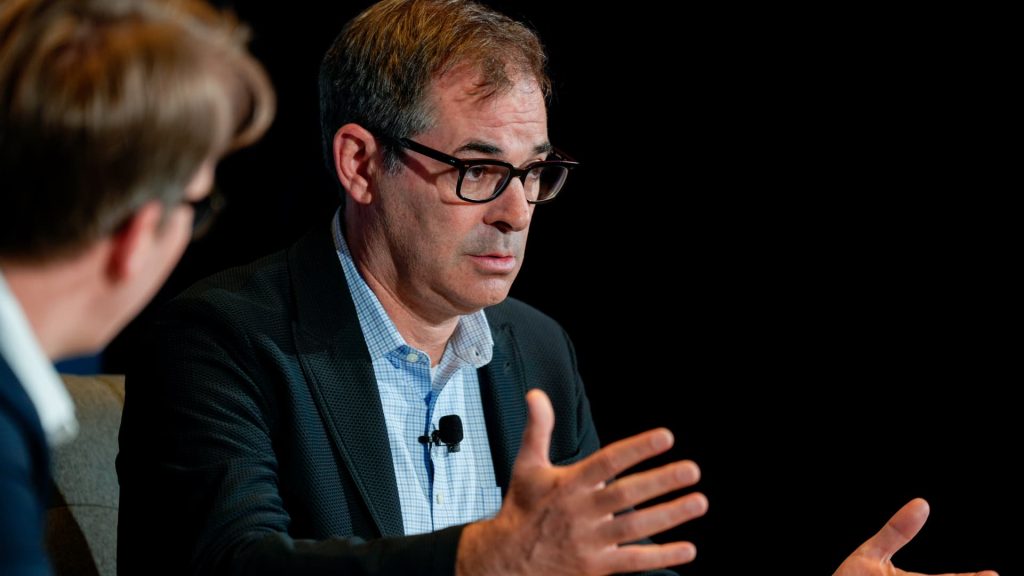In a significant development at the intersection of technology and finance, CoreWeave, a cloud infrastructure supplier, has seen a notable surge in its stock prices following positive earnings reports from key clients Microsoft and Meta. As the International Monetary Fund adjusts its global growth forecasts amid economic uncertainties linked to geopolitical tensions, CoreWeave’s market debut has drawn attention from investors anxious about the future of cloud infrastructure investment. The rise in shares accompanies concerns regarding potential setbacks due to US tariffs, prompting skepticism about growth in the technology sector.
| Article Subheadings |
|---|
| 1) CoreWeave’s Market Performance |
| 2) Earnings Reports Impact on Stock |
| 3) Concerns Over Tariffs and Investment |
| 4) Microsoft’s Commitment to Cloud Growth |
| 5) Future Outlook for CoreWeave |
CoreWeave’s Market Performance
CoreWeave, a significant player in cloud infrastructure services, has experienced a remarkable boost in stock price shortly after its public market debut in March. The company’s shares jumped as much as 17% following positive news from large clients, particularly Microsoft. Analysts attribute this upswing to investor confidence and optimism surrounding CoreWeave’s role in supporting the growing demand for cloud services. As a cloud supplier leaning heavily on Nvidia graphics processing units (GPUs), CoreWeave is uniquely positioned to benefit from the ongoing advancements in artificial intelligence technologies.
Earnings Reports Impact on Stock
The immediate catalyst for CoreWeave’s stock surge was the recently released earnings reports from Microsoft and Meta. Financial results showed that Microsoft had exceeded market expectations, especially in its cloud services segment, where Azure reported a 33% increase from the previous year. Such growth in cloud services sends a strong signal about the ongoing investment in technology and infrastructure, making CoreWeave’s stock a point of interest for investors looking for growth opportunities amidst potential market fluctuations. Furthermore, Meta’s raised capital expenditures forecast contributes to the overall positive sentiment surrounding CoreWeave, cementing its relevance in the cloud supplier ecosystem.
Concerns Over Tariffs and Investment
However, optimism is tempered by concerns surrounding President Donald Trump‘s recent tariff announcements. With notable implications for the tech industry, these tariffs have raised fears that investments in cloud infrastructure may slow down as companies reassess their strategies to accommodate increased costs. Executives within Microsoft highlighted this ambivalence when they indicated potential delays or adjustments in their infrastructure projects. In light of these developments, some investors are cautious, fearing a possible contraction in growth expectations amid signs of a global trade conflict. The market remains sensitive to any news regarding additional tariffs or changes in trade policies that could adversely affect investment.
Microsoft’s Commitment to Cloud Growth
Despite the looming threat of tariffs, the leadership at Microsoft remains steadfast in its cloud growth ambitions. In a recent earnings call, CEO Satya Nadella assured investors that Microsoft has long been accustomed to adjusting its infrastructure investments based on market conditions. The company continues to emphasize that its cloud services, including Azure, are integral to driving future revenue growth. Finance chief Amy Hood projected further capital expenditure growth for the 2026 fiscal year, albeit at a slower pace than previously anticipated. This relatively bullish outlook has been reassuring for investors, reflecting Microsoft’s commitment to expanding its infrastructure and capabilities.
Future Outlook for CoreWeave
As CoreWeave prepares to issue its first earnings report as a public company on May 14, the expectations are mounting. With a strategic partnership signed with OpenAI worth $11.9 billion over five years, the company is diversifying its revenue streams beyond just reliance on Microsoft, which currently comprises about 62% of its total revenue. This shift indicates a strategic pivot, allowing CoreWeave to mitigate risks associated with fluctuations in any single client’s investment capacity. Notably, as CoreWeave competes with larger cloud providers as well as niche operators, its ability to adapt and expand will be crucial for gaining market share in an increasingly competitive landscape.
| No. | Key Points |
|---|---|
| 1 | CoreWeave’s stock price increased significantly after positive earnings reports from Microsoft and Meta. |
| 2 | Microsoft reported a 33% revenue increase in its cloud services for the past quarter. |
| 3 | Concerns about potential new tariffs and their impact on tech investments have emerged. |
| 4 | Microsoft’s leadership emphasizes continued investment in cloud infrastructure despite challenges. |
| 5 | CoreWeave is set to diversify its revenue streams with a significant partnership with OpenAI. |
Summary
The recent upward momentum in CoreWeave’s stock highlights the intricate connections between technology firms and broader economic conditions. As pivotal players like Microsoft and Meta announce their financial results, CoreWeave’s role as a cloud infrastructure supplier becomes increasingly vital. However, the looming presence of tariffs and global trade tensions introduces uncertainty, potentially inhibiting future investments in the tech sector. As CoreWeave prepares for its upcoming earnings report, the industry watches closely, eager to assess how the company will navigate these evolving market dynamics.
Frequently Asked Questions
Question: What is CoreWeave known for?
CoreWeave is a cloud infrastructure supplier that specializes in providing scalable computing resources, primarily using Nvidia graphics processing units (GPUs), which are crucial for industries leveraging artificial intelligence.
Question: How has Microsoft’s performance affected CoreWeave?
Microsoft’s strong performance in cloud services has positively influenced CoreWeave’s stock prices, as Microsoft accounts for a significant portion of CoreWeave’s revenue.
Question: What are the implications of US tariffs for tech companies?
US tariffs can increase costs for tech companies, potentially leading to slowed investments in infrastructure and uncertainty in growth forecasts, impacting companies reliant on international trade.
